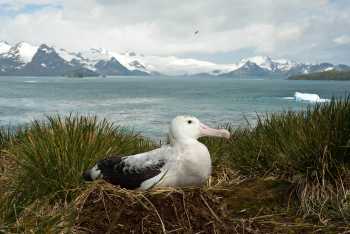The latest Wandering Albatross Diomedea exulans egg count in at least one locality in the South Atlantic has led surveyors to be guardedly optimistic about the future of the birds there.

At the end of December last year Sally Poncet and Ken Passfield undertook a count of Wandering Albatross eggs in nests on Albatross and Prion Islands in the Bay of Isles. This is the thirteenth consecutive year of survey, a period which has seen an alarming decline in the egg count across the two islands from a maximum of 217 in 2001 to a minimum of 159 in 2007 (click here to read a report on the previous season's census).
For logistical reasons the census in the Bay of Isles, normally done around 12 January, took place early this season. A total of 165 eggs was recorded, but Sally said: "There are a few more birds to lay yet, maybe up to six on Albatross Island, and at least one on Prion Island, as it is nearly two weeks earlier than usual and well before the last egg-lay date." Counts in recent seasons appear to show a cessation in the decline in numbers of breeding birds, maybe even signs of a slow recovery.
The researchers camped on Albatross Island from 29 December to 1 January. They then had just a single day to count the birds on Prion Island but were luckily blessed with good weather.
Other studies undertaken at Albatross and Prion Islands include censuses of giant petrels Macronectes; an assessment of the degradation of seabird habitat due to trampling of vegetation by fur seals; monitoring of tourism numbers from visiting cruise ships; and assessing any impact of the boardwalk on Prion Island.
The Bay of Isles Wandering Albatross censuses are to continue for at least another three years.
Click here to access the original story and to view the 13-year trend.
John Cooper, ACAP Information Officer, 22 January 2011

 English
English  Français
Français  Español
Español